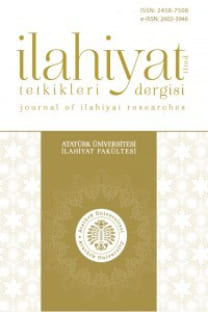KUR’AN’DA İBADET
ÖZKur’ân’ın hassasiyetle üzerinde durduğu konulardan biri de ibadettir. İbadet,insanların günlük hayatlarında önemli bir yer tutmaktadır. Bütün dinlerde, icraşekilleri farklı olmakla beraber ibadet vardır. Allah ile kul arasında kurulan ilişkideimandan sonra, ibadet aşaması gelmektedir.Bu makalede ibadet kelimesinin sözlük ve terim anlamları ortaya konulmuştur.İbadet ve tevhit ilişkisi üzerinde durulmuştur. Cahiliye dönemi Araplarınınputa tapıcılığından ve bunun sebeplerinden bahsedildikten sonra, Kur’an’ın şirkkoşmayı kesin olarak yasakladığı anlatılmıştır. İbadetin fıtrî bir ihtiyaç olduğuvurgulanmıştır.Anahtar Kelimeler: İbadet, Tevhit, Şirk, İman, Put ABSTRACTThe Worship of The Holy Qur’anOne of the topics that The Qur’an stops on it is worship. İt has an importantplace in daily lives of people. All religions have different shapes of worship. Therelationship that is established between God and human after faith is worship.İn this article is revealed the meaning dictionary and the term of the worship’sword. İt focuses on the relationship between worship and God’s union. Aftermention the period of ignorance, and it is referred to the reasons the Arab’s idolismis described The Qur’an’s forbid of worship to idols and focused that the worshipis a natural need.Keywords: Workship, God’s Union, Common, Faith, Idol
The Worship of The Holy Qur’an
The Worship of The Holy Qur’anOne of the topics that The Qur’an stops on it is worship. İt has an important place in daily lives of people. All religions have different shapes of worship. The relationship that is established between God and human after faith is worship. İn this article is revealed the meaning dictionary and the term of the worship’s word. İt focuses on the relationship between worship and God’s union. After mention the period of ignorance, and it is referred to the reasons the Arab’s idolism is described The Qur’an’s forbid of worship to idols and focused that the worship is a natural need.
Keywords:
Workship, God’s Union, Common, Faith, Idol,
___
- Abduh, Muhammed, Tefsiru’l-Menâr, Mısır, 1373.
- Abdulhamid, Muhsin, İslam ve Toplumsal Kalkınma, Ter. Mehmet Çakır, İstanbul, 19 Asım Efendi, Kamus Tercümesi, İstanbul, 1305. Bayrakdar, Mehmet, İslam İbadet Fenomenolojisi, Ankara, 1987. Bilgiz, Musa, “Kur’an’da Amellerin Değer Yönünden Mukayesesi” Atatürk Üniv. İlahiyat Fak. Dergisi, Erzurum, 2003, Sayı: 20, s. 134. Bilmen, Ö. Nasûhi, Büyük İslâm İlmihâli, İstanbul, 1970. Cürcanî, Seyyid Şerif, Ta’rifât, Kahire, ts. Çağatay, Neş’et, İslam Öncesi Arap Tarihi ve Cahiliye Çağı, Ankara, 1971. Demirci, Muhsin, Kur’an’ın Ana Konuları, İstanbul, 2008. Dihlevi, Şah Veliyyullah, İslam Düşünce Rehberi, Ter. M. Erdoğan, İstanbul, 2003. Isfahanî, Ragıb, Müfredat, Tah. S. A. Davudî, Beyrut, 1992. İbn al-Kalbi, Putlar Kitabı, Çev. B. Düşüngen, Ankara, 1969. İbn Manzûr, Lisânu’1-Arab, Beyrut, 1978. Karagöz, İsmail, Kur’ân’da İbâdet Kavramı, İstanbul, 1997. Köksal, M. Asım, İslam Tarihi, XVIII, 329. Mahmud Es’ad, İslam Tarihi, Sadeleştirenler: A. Lütfi Kazancı- O. Kazancı, İstanbul, 19 Olgun, Tâhirü’l Mevlevî, Müslümanlıkta İbadet Tarihi, İstanbul, 1963. Özsoy, Ömer, Sünnetullah, Ankara, 1999. Râzî, Fahreddin, Mefâtîhu’l-Ğayb, Mısır, ts. Taplamacıoğlu, Mehmet, Din Sosyolojisi, Ankara, 1975. TDV, İA, XIX, İbadet Maddesi. Tehânevî, Keşşâfu Istılâhâti’l-Funûn, Kalküta, 1862. Yazır, Elmalılı M. Hamdi, Hak Dini Kur’an Dili. Yeğin, Abdullah ve arkadaşları, Osmanlıca-Türkçe Ansiklopedik Büyük Lûgat, İstanbul, 19 Yıldırım, Suad, Kur’an’da Ulûhiyyet, İstanbul, 1987. Zebîdî, Tâcu’l-Arûs, Beyrut, 1966. Zemahşerî, Keşşaf, Ys., 1983.
- ISSN: 2458-7508
- Yayın Aralığı: Yılda 2 Sayı
- Başlangıç: 1975
- Yayıncı: Atatürk Üniversitesi İlahiyat Fakültesi
Sayıdaki Diğer Makaleler
DÂVUD-İ KARSÎ (1169/1756):KELÂMÎ GÖRÜŞLERİ ve KAYNAKLARI
DİNDARLIK SORUNU: PSİKOLOJİK BİR TAHLİL
YUNAN-ROMA UYGARLIĞINDA İNSAN-TANRILARA TAPINMA TÖRENİ OLARAK: KİLİSE EKMEK-ŞARAP AYİNİ
ANTİKÇAĞDAN ALMAN İDEALİZMİNE;ESTETİK BİR DEĞER OLARAK GÜZELLİK
ŞİHABUDDİN SÜHREVERDİ’NİN NÜBÜVVET ANLAYIŞI
HZ. PEYGAMBER’İN HADİSLERİNDE RENKLERİN DİLİ
BÜTÜN DİNLER AYNI HAKİKATE Mİ GÖTÜRÜR?-TANRI ANLAYIŞLARI BAĞLAMINDA BİR DEĞERLENDİRME
EBÛ HUREYRE’YE YÖNELİK İKSÂRU’L-HADÎS ELEŞTİRİSİNE FARKLI BİR BAKIŞ
